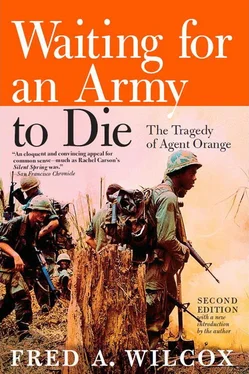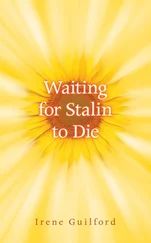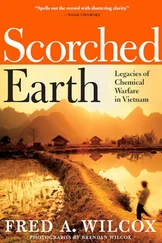On August 31, 1982, officials of the Veterans Administration told the VA’s Advisory Committee on Health-Related Effects of Herbicides that the epidemiological study has been delayed because the VA “still must determine whether it can adequately identify soldiers who came into contact with the herbicide.” Unless this can be done, said the officials, the study will not be conducted. In addition, said Dr. Barclay Shepard, chairman of the advisory body, “a pilot program must be conducted to show the study is feasible.” All this, said Dr. Shepard, will take another six or seven years. The VA does plan to investigate whether veterans are fathering a “disproportionately high number of babies born with birth defects,” and this study is scheduled to be completed, provided that are no bureaucratic snags, by 1984. 9
Sweeping his empty beer stein aside, Jim Wares places his left hand on the table, fingers outstretched and pressed tightly together. His right hand forms an ax, which he raises in an eyebrow salute then slams down on the supine fingers and thumb of his left hand.
“If you took a guillotine just dropped it straight across, including the top of the thumb, that is his hand. There’s a little bud there, and a bud there,” pointing to the first and fourth knuckle, “and a hole here where the finger should be, and then one here. And you could honestly put a spirit level across there and it’s so even that it’s as though an ax had fallen and chopped them right off. But in spite of it all, it’s mild compared to a lot of things that other veterans’ children suffer from.”
Wares signals the bartender, who—moonwhite, emaciated, and bored—delivers another round to the table, then settles down in front of the television. On Wide World of Sports a boxer, inspired by a delirious crowd, is battering his opponent unconscious. Three men at the bar give a desultory cheer as the referee steps between the two contestants and stop the fight. “I thought he was going to kill the poor bastard,” Wares announces, breaking the bitter silence that has followed his description of his son’s birth defect. The interview, stalled as others have behind a wall of anger, continues.
By 1962, Wares explains, the Australian government had committed thirty military instructors to Vietnam, a number that was increased to approximately one hundred by 1965. But by then the South Vietnamese government appeared to be floundering. The war against “communist insurgents” was going poorly, and a plea went out to the United States and Australia for more help. Convinced that the insurgency was part of a “thrust by Communist China between the Indian and Pacific oceans,” a move that would mean a direct threat to his country, the Australian prime minister, Sir Robert Menzies, agreed to send a full infantry battalion to Vietnam. As the Australian government’s involvement in the war increased, its troops were given an area of operations that included Phuoc Tuy Province, southeast of Saigon, with its center of operations based in Nui Dat. The area was considered vital to the South Vietnamese government because it was situated between Saigon and the important port of Vung Tau, and one of the Australians’ primary tasks was to keep Route 15 open between Saigon and Vung Tau. To accomplish this they would fight many bitter engagements with both VC and NVA units. That much of the local populace was sympathetic to the VC was well known, and to reduce the chance of ambush, the Australians eventually began using herbicides in Phuoc Tuy Province. By the war’s end approximately fifty thousand Australians had served in Vietnam, with many of the men serving two tours.
One of Ware’s most vivid memories of Vietnam is the mosquitoes—attacking like schools of piranhas, tattooing his skin with welts, which when scratched turned into festering sores. The mosquitoes also carried malaria, so when a C-123s flew over the base camp trailing white fog from its wings, the men almost felt like cheering.
“What I saw them spraying was a mosquito killer, and that’s all we knew it to be at that time. What we didn’t know was that it was malathion. The C-123s came over once a fortnight, or once a week or month, but it was very regular. And we were very happy with it because it killed the bugs. It smelled for a while, but it did the job, and that’s all we cared about at that time, mate.”
Wares also observed backpack spraying and spraying from trucks, but he had been told nothing about herbicides and had no reason to question the purpose of spraying. Until his son was born with missing fingers and only a partial thumb on one hand and he began hearing stories of other Australian veterans whose children were born with deformed feet, cleft palates, missing limbs, holes in their hearts, partial brains, and skin rashes, Wares gave the spraying little thought.
Thirteen years after he returned from Nui Dat, Wares and I are seated in the lounge of a Ramada Inn in New York City. He has arrived from London to see Bob Gibson, an Australian Vietnam veteran who has been touring the United States for eight weeks, talking with American veterans and leaders of the veterans’ movement, and gathering information he hopes will be useful to Australian veterans suffering from the effects of exposure to toxic chemicals.
In 1967 Gibson was an infantryman in Phuo Tuy Province. Returning from three days in the bush he was handed a gas mask and ordered to begin spraying herbicides on the barbed wire surrounding his base camp. Gibson reluctantly complied, wondering why, since he had no training for this kind of work, he had been chosen for such miserable duty. Wearing a gas mask in Vietnam was like burying one’s face in hot wet sand, and Gibson and others assigned to the detail quickly discarded their protective gear. Their clothes stuck to their skin, sweat drained into their eyes, and the spray was often blown directly back into their faces. Within ten days the mucous membranes in Gibson’s nose had deteriorated so much that he suffered from frequent nosebleeds. His skin was covered with a painful rash, and his stomach was constantly upset. But he was nineteen and “very patriotic” at the time, and he believed that if the herbicides reduced the enemy’s cover, then he could easily suffer a bit of discomfort.
Gibson’s commanders “did tell us what we were spraying, and as infantry soldiers we thought it was a good thing. It done the job. We could see what it was doing, and it was making it easier for us. But they didn’t tell us what the outcome would be, the health problems it could cause. We were told that they were going to defoliate, and we thought this was the best thing that they’d ever come up with. And we used to laugh about it; you know, we thought it would be a good idea if they defoliated the whole of South Vietnam. It would be kind of like fightin’ in the desert.
“They did issue us gas masks that first day, but we couldn’t breathe in them because of the humidity. And I was an infantry soldier just come back from three days of ambushes, and we were just picked out at random to use the stuff. We know now that it was nothing more than experimental. We’ve got documents on the scientist who was controlling the spraying. He was sent there by the Australian Department of Defense to experiment with various chemicals, 2,4,5-T, 2,4-D, and others. But the fellows who were picking us out at the time to do this work were infantry sergeants, and they knew as much about chemicals as I did, and that was damn nothing. So we told the sergeant after that first day that we couldn’t breathe using this stuff, and he said, ‘I’ll check on it tonight for you,’ and the next day he said, ‘Don’t worry, leave the gas masks and everything off So we used to get in back there and spray this stuff through the barbed wire, and it would come back on us. And your nose would start to bleed, your lips would all get blisters on them, your mucous membranes would break down, and he, the scientist in charge, has documented it all.”
Читать дальше











